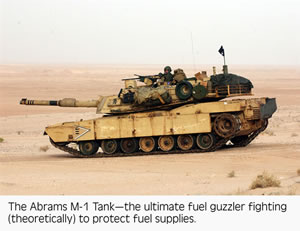
Limitations
- Introduction
- Avoiding the Obvious
- Insoluble Problems, Soluble Opportunities
- Bottomless Wells?
- Oil, Peaking?
Values
- Introduction
- Trouble with Ideology
- The Good Life
- Changing Separately and Together
- Eating for the Planet
- Small Steps, Large Ideals
- Offsetting Without Tears
Design
- Introduction
- Dead Spaces
- Requiem for the Car Industry
- Smart Cars, Hybrids, and Our Spaceship
- Hip Deep in the Big Muddy
- The Virtues of Age
- Two Suburbs—An American Journey
- The Wasteland at the End of the Street
Strategy
![]()
 Slipping on Oil
Slipping on Oil
Every now and then we should pause to remember that our heavy dependence on fossil fuels isn't just choking us to death, warming the planet, and threatening the polar bear. It has caused us to make policy decisions and strategic blunders that have made the world less safe and much of the world's population less free. In the search for oil supplies, the West (not just the United States, though as the largest consumer we bear much of the responsibility) has overthrown elected governments, supported totalitarian regimes, and brought chaos to Iraq (and possibly the whole of the Middle East) in the name of building democracy. The cost to us in blood and treasure has been enormous, and for our efforts we have gained a poisoned chalice—a planet at risk and an economy subject to the whims of the oil markets.
The height of our folly was the invasion of Iraq in 2003. In 2007, nearly everyone but a few hard-core supporters recognizes that the war has become a fiasco. What few remember was that the forcible overthrow of Saddam Hussein was an essential component of the neo-conservative program long before the attacks of September 11, 2001 which made an invasion possible as (allegedly) part of the "War on Terror."
In neo-con theory, the overthrow of Saddam would accomplish a lot of good things:
- It would rid the world of a repugnant dictator;
- It would establish stable democracy in a major Middle Eastern country;
- It would neutralize Iraq's military power;
- It would lead to a wave of democratization throughout the Middle East;
- It would make Israel more secure; and
- It would make oil supplies more secure by giving the West another oil-rich ally—thereby also keeping oil prices under control.
Readers who are unsophisticated in neo-conservative thinking may not quite see the connection between invading Iraq and many of these benefits to the world. But whether there was a connection or not—whether the war could, even in theory, have the promised benefits—became irrelevant almost as soon as the first Coalition troops crossed the Iraq border. The actual war, as opposed to the theoretical one, overthrew Saddam Hussein—and that was all. There is no stable democracy in Iraq; the power of Saddam's military turned out to be a myth; democracy has not triumphed throughout the Middle East; Israel is not more secure; and the price of oil has gone up as demand outpaced supply and Iraqi oil failed to come into the marketplace.
Neo-con theory had fallen into a trap common to armchair strategy. It had ignored Napoleon's maxim that strategists must not "form a picture." Putting this in modern terms, it had based its theory on the best-case scenario—welcoming throngs with flowers; a government in exile returning triumphantly; democracy established quickly and peacefully—and not tried to assess what was really likely. A realistic assessment, which the government could have heard from its own State Department, its intelligence professionals, and the many non-government organizations that had worked in Iraq, would have (and did) warn against the whole enterprise.
Central to the Iraq blunder was the quest for oil. Oil was supposed to finance Iraqi reconstruction. Oil from a democratic and pro-Western Iraq was supposed to increase tight supplies and make the West less threatened by the Organization of Petroleum Exporting Countries (OPEC) and the unpredictability of oil-rich governments like that of Venezuela. A stable and democratic Middle East was, perhaps, desirable in itself; but it was even more important because interruptions in the oil supply would be less likely.
War for oil has always been an illusion. In the early 1990s, the U.S. Defense Department used more oil annually than Sweden—and this with no major war in progress. The Iraq War almost certainly used oil faster than working Iraqi oil fields could replace it (and the Iraqi oil fields work sporadically at best). And to this day the oil has not begun flowing to the West or anywhere else.
The way to avoid oil shortages is and has always been to use less oil, which is both simpler and cheaper in blood and treasure than making war. War for oil has, like war for any reason, unintended and often ruinous consequences. Conservation by its nature is far less likely to be destructive than war. It has the added advantage that it does less harm to the environment than modern mechanized warfare. And it does not leave us in a strategic box that we fashioned by our own blunders and now cannot escape.